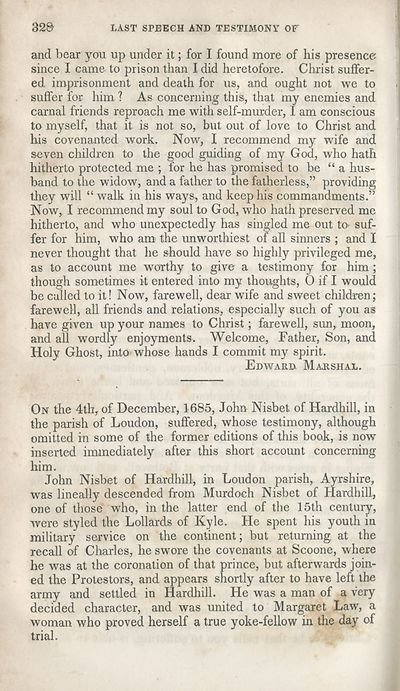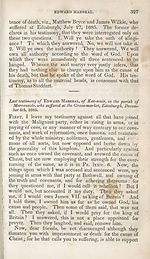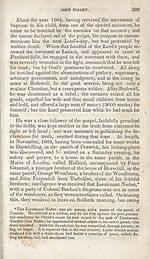Religion & morality > Cloud of witnesses, for the royal prerogatives of Jesus Christ, or, The last speeches and testimonies of those who suffered for the truth in Scotland, in the years 1681-1688, with an appendix, containing the Queensferry paper, Torwood excommunications, &c
(384)
Download files
Complete book:
Individual page:
Thumbnail gallery: Grid view | List view

32a
LAST SPEECH AND TESTIMONY OF
and bear you up under it; for I found more of his presence
since I came to prison than I did heretofore. Christ suffer¬
ed imprisonment and death for us, and ought not we to
suffer for him ? As concerning this, that my enemies and
carnal friends reproach me with self-murder, I am conscious
to myself, that it is not so, but out of love to Christ and
his covenanted work. Now, I recommend my wife and
seven children to the good guiding of my God, who hath
hitherto protected me ; for he has promised to be “ a hus¬
band to the widow, and a father to the fatherless,” providing
they will “ walk in his ways, and keep his commandments.”
Now, I recommend my soul to God, who hath preserved me
hitherto, and who unexpectedly has singled me out to' suf¬
fer for him, who am the unworthiest of all sinners ; and I
never thought that he should have so highly privileged me,
as to account me worthy to give a testimony for him ;
though sometimes it entered into my thoughts, O if I would
be called to it! Now, farewell, dear wife and sweet children;
farewell, all friends and relations, especially such of you as
have given up your names to Christ; farewell, sun, moon,
and all wordly enjoyments. Welcome, Father, Son, and
Holy Ghost, into whose hands I commit my spirit.
Edward Marshal.
On the 4th, of December, 1685, John Nisbet of Hardhill, in
the parish of Loudon, suffered, whose testimony, although
omitted in some of the former editions of this book, is now
inserted immediately after this short account concerning
him.
John Nisbet of Hardbill, in Loudon parish, Ayrshire,
was lineally descended from Murdoch Nisbet of Hardhill,
one of those who, in the latter end of the 15th century,
were styled the Lollards of Kyle. He spent his youth in
military service on the continent; but returning at the
recall of Charles, he swore the covenants at Scoone, where
he was at the coronation of that prince, but afterwards join¬
ed the Protestors, and appears shortly after to have left the
army and settled in Hardhill. He was a man of a very
decided character, and was united to Margaret Law, a
woman who proved herself a true yoke-fellow in the day of
trial.
LAST SPEECH AND TESTIMONY OF
and bear you up under it; for I found more of his presence
since I came to prison than I did heretofore. Christ suffer¬
ed imprisonment and death for us, and ought not we to
suffer for him ? As concerning this, that my enemies and
carnal friends reproach me with self-murder, I am conscious
to myself, that it is not so, but out of love to Christ and
his covenanted work. Now, I recommend my wife and
seven children to the good guiding of my God, who hath
hitherto protected me ; for he has promised to be “ a hus¬
band to the widow, and a father to the fatherless,” providing
they will “ walk in his ways, and keep his commandments.”
Now, I recommend my soul to God, who hath preserved me
hitherto, and who unexpectedly has singled me out to' suf¬
fer for him, who am the unworthiest of all sinners ; and I
never thought that he should have so highly privileged me,
as to account me worthy to give a testimony for him ;
though sometimes it entered into my thoughts, O if I would
be called to it! Now, farewell, dear wife and sweet children;
farewell, all friends and relations, especially such of you as
have given up your names to Christ; farewell, sun, moon,
and all wordly enjoyments. Welcome, Father, Son, and
Holy Ghost, into whose hands I commit my spirit.
Edward Marshal.
On the 4th, of December, 1685, John Nisbet of Hardhill, in
the parish of Loudon, suffered, whose testimony, although
omitted in some of the former editions of this book, is now
inserted immediately after this short account concerning
him.
John Nisbet of Hardbill, in Loudon parish, Ayrshire,
was lineally descended from Murdoch Nisbet of Hardhill,
one of those who, in the latter end of the 15th century,
were styled the Lollards of Kyle. He spent his youth in
military service on the continent; but returning at the
recall of Charles, he swore the covenants at Scoone, where
he was at the coronation of that prince, but afterwards join¬
ed the Protestors, and appears shortly after to have left the
army and settled in Hardhill. He was a man of a very
decided character, and was united to Margaret Law, a
woman who proved herself a true yoke-fellow in the day of
trial.
Set display mode to:
![]() Universal Viewer |
Universal Viewer | ![]() Mirador |
Large image | Transcription
Mirador |
Large image | Transcription
| Permanent URL | https://digital.nls.uk/132220247 |
|---|
| Description | Thousands of printed books from the Antiquarian Books of Scotland collection which dates from 1641 to the 1980s. The collection consists of 14,800 books which were published in Scotland or have a Scottish connection, e.g. through the author, printer or owner. Subjects covered include sport, education, diseases, adventure, occupations, Jacobites, politics and religion. Among the 29 languages represented are English, Gaelic, Italian, French, Russian and Swedish. |
|---|

